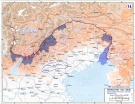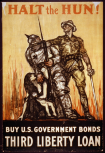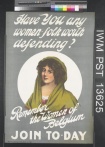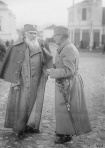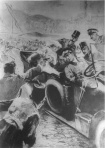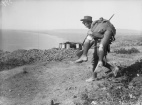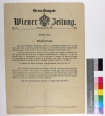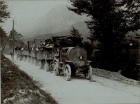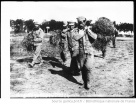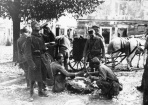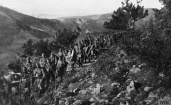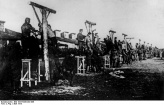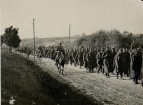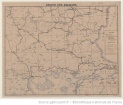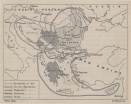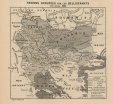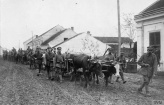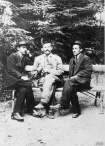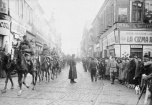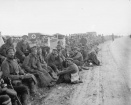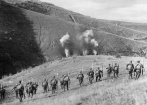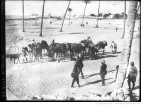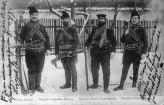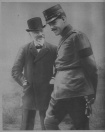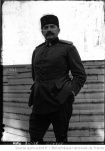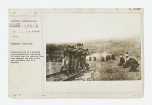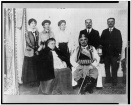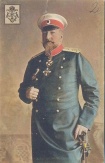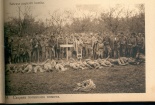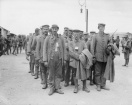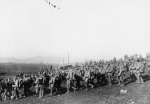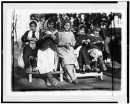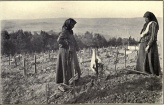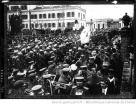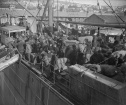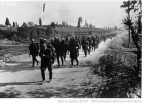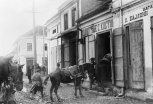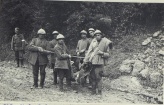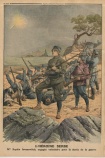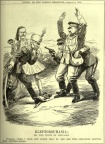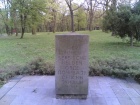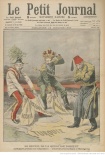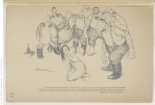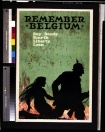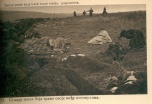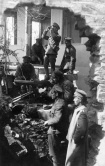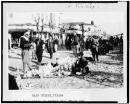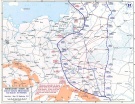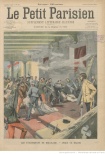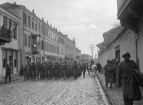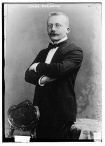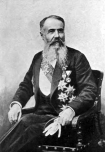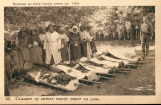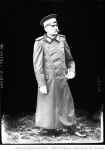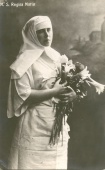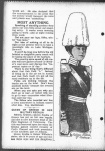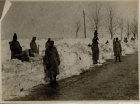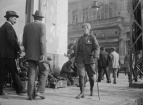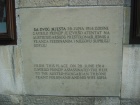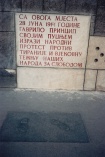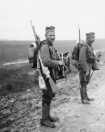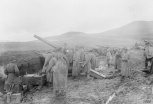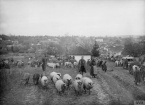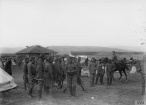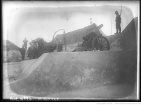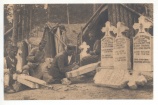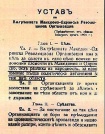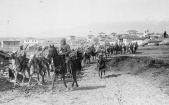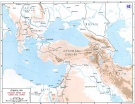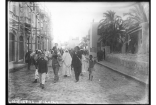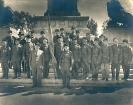Regions Serbia
Survey Articles (Regional)
Regional Thematic Articles
- Bereavement and Mourning (South East Europe)
- Centenary (Serbia)
- Civilian and Military Power (South East Europe)
- Film/Cinema (South East Europe)
- Historiography 1918-Today: Serbia and Montenegro (South East Europe)
- Literature: Serbia (South East Europe)
- Occupation during and after the War (Austria-Hungary)
- Occupation during and after the War (South East Europe)
- Post-war Economies (South East Europe)
- Post-war Societies (South East Europe)
- Press/Journalism: Serbia (South East Europe)
- Pre-war Military Planning (South East Europe)
- Prisoners of War and Internees (South East Europe)
- Propaganda at Home and in Exile (South East Europe)
- War Aims and War Aims Discussions (South East Europe)
- Warfare 1914-1918 (South East Europe)
- Women's Mobilization for War (South East Europe)
Encyclopedic Entries
See also
- Alliance System 1914
- Antisemitism
- Atrocities
- Commemoration, Cult of the Fallen
- Controversy: The Media's Responsibility for Crises and Conflicts in the Age of Imperialism
- Espionage
- Health, Disease, Mortality; Demographic Effects
- Imperialism
- July Crisis 1914
- Nationalism
- Occupation during the War
- Paramilitary Violence
- Post-war Societies
- Prisoners of War
- Refugees
- Resettlement
- Social Costs of War
- The Paris Peace Conference and its Consequences
- The Way to War
- War in the Balkans
- War Losses
- Willingly to War. Public Response to the Outbreak of War
- Women War Reporters
Survey Articles (Regional)
-
A short synthesis on Serbia's role and experience in the Great War encompasses several questions that still provoke controversies and offer many carefully reexamined data on issues such as war … READ MORE
Regional
Regional Thematic Articles
-
The Great War impacted the lives of almost every family in South East Europe. Unable to properly mourn the bodies of their loved ones who died at the front far from home, survivors combined … READ MORE
Regional Thematic -
The anniversary has reaffirmed the belief that the First World War still has a very strong resonance in Serbian society. Numerous actors, state and private ones alike, took part in Serbia’s … READ MORE
Regional Thematic -
In pre-war South East Europe, both civilian and military powers focused on the creation of independent national states and the reclamation of imperial ''irredenta''. This goal, aggressively pursued, … READ MORE
Regional Thematic -
This article offers a synthetic picture of the presence of World War I motifs in South-Eastern European cinema. It also offers an overview of the filmography of World War I and some conclusions about … READ MORE
Regional Thematic -
Serbian historiography was analysed in light of Serbia’s historical position and role in the Western Balkans. The topics evolved out of the war’s origin and course, as well as out of Serbia’s … READ MORE
Regional Thematic -
The Serbian literature of the First World War, written by authors both from the Kingdom of Serbia and the Habsburg Monarchy, ranges from war chronicles by soldier-writers to avant-garde memoirs and … READ MORE
Regional Thematic -
While on the Western Front there were only limited territorial movements, the Eastern Front and warfare in southeastern Europe, including parts of Italy, had all the characteristics of mobile … READ MORE
Regional Thematic -
The occupation of South East Europe 1915-1918 had a complex structure reflecting different and often conflicting territorial claims and goals. In the fall of 1915 Serbia was divided into … READ MORE
Regional Thematic -
The First World War devastated the human workforce through death and invalidity and caused a massive destruction of infrastructure and material in South East Europe. Its economies underwent a major … READ MORE
Regional Thematic -
South East European societies faced several challenges in the post-war period. Their population changed significantly as a consequence of war losses, war-conditioned migrations and territorial … READ MORE
Regional Thematic -
Not unlike its regional counterparts, the standards of press and journalism in Serbia during the Great War was problematic. Most of the no more than twenty newspapers in Belgrade operating at the … READ MORE
Regional Thematic -
Nations of South East Europe had just ended a short but very intense period of war when, one by one, they became involved in global conflict. Some were forced in while others were attracted by … READ MORE
Regional Thematic -
This article analyzes the treatment and living conditions of prisoners of war (POWs) and civilian internees from Serbia, Montenegro and Romania in Austro-Hungarian, Bulgarian and German camps during … READ MORE
Regional Thematic -
This article explores the nature of propaganda in those South East European states and territories that participated in the First World War, specifically Bulgaria, Greece, Montenegro, Romania, … READ MORE
Regional Thematic -
This article offers a survey of the main currents in South East Europe in regard to the war aims of the belligerents from 1914. Some war aims had deep roots in the pre-war years. The author puts … READ MORE
Regional Thematic -
The main intention of this article is to chronologically present major events on the battlegrounds of South East Europe in the Great War and to demonstrate how it actually represented a continuation … READ MORE
Regional Thematic -
This article presents the role of women in South East Europe during World War I (1914-1918). Changing circumstances forced women to live behind the frontlines in wartime. Because men involved in the … READ MORE
Regional Thematic
Encyclopedic Entries
-
The Balkan Wars were two sharp conflicts that heralded the onset of World War I. In the First Balkan War a loose alliance of Balkan States eliminated the Ottoman Empire from most of Europe. In the … READ MORE
Entry -
This article looks at the Black Hand from its origins to the demise of its leader, Dragutin Dimitrijević "Apis", in the Salonika Trial of 1917, focussing on the role the association played in … READ MORE
Entry -
''Chetnik'' is a common name for a member of the auxiliary or paramilitary units used by the Serbian army for guerrilla warfare during the Great War. The ''chetnik'' tradition dates from the time of … READ MORE
Entry -
Peter I Karadjordjević was King of Serbia from 1903 to 1918, and King of Serbs, Croats, and Slovenes from 1918 to 1921. He also translated the essay “On Liberty” by John Stuart Mill … READ MORE
Entry -
Kosta Pecanac was a prominent ''chetnik'' leader before the Great War and one of the leaders of the Toplica uprising against the Bulgarian and Austro-Hungarian occupation of Serbia in 1917. Between … READ MORE
Entry -
The Prochaska Affair was a diplomatic dispute between Austria-Hungary and Serbia, ostensibly concerning the fate of the Austro-Hungarian consul in Prizren. However, it carried deeper implications for … READ MORE
Entry -
Although rape was not usually systematic, it occurred frequently on all fronts during the First World War, during both invasion and occupation periods. It was often used in propaganda to discredit … READ MORE
Entry -
Although ''sanjak'' usually means any one of many Ottoman administrative units, one has become known as “the Sanjak.” Following the Treaty of Berlin the Sanjak of Novi Pazar became the symbol of … READ MORE
Entry -
Stephan Baron von Sarkotić was an Austro-Hungarian general who had already made his mark as a political officer prior to the outbreak of World War I. During the war, he formulated different … READ MORE
Entry
See also
-
Alliances were an important feature of the international system on the eve of World War I. The formation of rival blocs of Great Powers has previously considered a major cause of the outbreak of war … READ MORE
Thematic -
The First World War and its direct repercussions in the postwar period (revolution, counterrevolution, the founding of republics, and the Paris peace treaties) mark a profound caesura not only in the … READ MORE
Thematic -
The term "atrocity" describes an act of violence condemned by contemporaries as a breach of morality or the laws of war. "Atrocities" are culturally constructed; by 1914, an international discourse … READ MORE
Thematic -
The First World War ushered in an unprecedented wave of commemorations. Mass death elicited a construction spree in memorial objects and sites across all countries and territories involved in the … READ MORE
Thematic -
Controversy: The Media's Responsibility for Crises and Conflicts in the Age of Imperialism
By Peter Geiss
The article discusses the role of the media in the complex international process leading to the First World War with a focus on the press of the great powers. Recent research has shown that the … READ MORE
Thematic -
During the entire war, warring powers used the “secret war” to try to break the balance of the battlefield. Generally created in the previous few decades, intelligence and security services saw … READ MORE
Thematic -
The rapid spread of epidemics ravaged military personnel and civilians in and outside Europe’s warzones during the Great War. Further, the great influenza pandemic of 1918-1919 became a global … READ MORE
Thematic -
This article focuses on the extent to which imperialism contributed to the outbreak of the First World War. The first part describes the emergence of specific imperialist cultures and attitudes in … READ MORE
Thematic -
The international crisis that began with the assassination of Archduke Franz Ferdinand in Sarajevo on 28 June 1914 and culminated in the British declaration of war on Germany on 4 August is referred … READ MORE
Thematic -
This article offers an overview of the progress of nationalism and the national idea starting with its origins as a mass political programme during the French Revolution and tracing its passage up to … READ MORE
Thematic -
After an initial wave of interest in 1914 and the immediate post-war period, international historiography long neglected the wartime occupation of territories inhabited by large civilian populations. … READ MORE
Thematic -
While World War I featured the largest armies ever assembled, it was also fought by unprecedented numbers of paramilitary fighters. In a situation where the line between combatant and non-combatant … READ MORE
Thematic -
The First World War caused unprecedented disruption to societies across the globe, from Western and (especially) Central and Eastern Europe to East Africa. While many survivors could celebrate an end … READ MORE
Thematic -
The First World War marked the shift from a 19th century, relatively ''ad hoc'' management of prisoners of war, to the 20th century’s sophisticated prisoner of war camp … READ MORE
Thematic -
This article addresses the scale of wartime population displacement in continental Europe, the relief efforts made on behalf of refugees, their impact on host communities, and the cultural … READ MORE
Thematic -
The conduct of warfare in 1914-1918 included extensive population resettlement in all theatres of war in Europe, both as a result of pre-emptive decisions by civilians to flee in order to evade the … READ MORE
Thematic -
This article explores how the anticipation, reality, and memory of sacrifice informed experiences and legacies of World War I. Drawing on representative examples from multiple nations, I suggest that … READ MORE
Thematic -
This article offers an overview of peacemaking after the First World War from the armistices of 1918 until 1923. It considers the outcomes of the five Parisian treaties (Versailles, Saint-Germain and … READ MORE
Thematic -
Imperialism shaped almost every facet of international politics from 1898 to 1914. Imperial concerns brought Britain into entente relationships with France and Russia. This Triple Entente often … READ MORE
Thematic -
The Balkan Wars erupted in South Eastern Europe in October 1912. Fighting continued intermittently in the region until July 1914. As the First World War expanded into much of Europe, fighting … READ MORE
Thematic -
Military sources provide the primary statistics of war losses and casualties during World War I. In order to review and eventually revise their figures, one must understand how military statistics … READ MORE
Thematic -
It may surprise us to learn that some sectors of the European public were in favour of the war in 1914. The impact of modern weapons was not well understood and many people in the government, … READ MORE
Thematic -
Female war reporters from belligerent and neutral countries were present in the major war theatres in Europe and the Middle East throughout 1914 to 1918. While admission of journalists to the war … READ MORE
Thematic
Survey Articles (Regional)
-
A short synthesis on Serbia's role and experience in the Great War encompasses several questions that still provoke controversies and offer many carefully reexamined data on issues such as war … READ MORE
Regional
Regional Thematic Articles
-
The Great War impacted the lives of almost every family in South East Europe. Unable to properly mourn the bodies of their loved ones who died at the front far from home, survivors combined … READ MORE
Regional Thematic -
The anniversary has reaffirmed the belief that the First World War still has a very strong resonance in Serbian society. Numerous actors, state and private ones alike, took part in Serbia’s … READ MORE
Regional Thematic -
In pre-war South East Europe, both civilian and military powers focused on the creation of independent national states and the reclamation of imperial ''irredenta''. This goal, aggressively pursued, … READ MORE
Regional Thematic -
This article offers a synthetic picture of the presence of World War I motifs in South-Eastern European cinema. It also offers an overview of the filmography of World War I and some conclusions about … READ MORE
Regional Thematic -
Serbian historiography was analysed in light of Serbia’s historical position and role in the Western Balkans. The topics evolved out of the war’s origin and course, as well as out of Serbia’s … READ MORE
Regional Thematic -
The Serbian literature of the First World War, written by authors both from the Kingdom of Serbia and the Habsburg Monarchy, ranges from war chronicles by soldier-writers to avant-garde memoirs and … READ MORE
Regional Thematic -
While on the Western Front there were only limited territorial movements, the Eastern Front and warfare in southeastern Europe, including parts of Italy, had all the characteristics of mobile … READ MORE
Regional Thematic -
The occupation of South East Europe 1915-1918 had a complex structure reflecting different and often conflicting territorial claims and goals. In the fall of 1915 Serbia was divided into … READ MORE
Regional Thematic -
The First World War devastated the human workforce through death and invalidity and caused a massive destruction of infrastructure and material in South East Europe. Its economies underwent a major … READ MORE
Regional Thematic -
South East European societies faced several challenges in the post-war period. Their population changed significantly as a consequence of war losses, war-conditioned migrations and territorial … READ MORE
Regional Thematic -
Not unlike its regional counterparts, the standards of press and journalism in Serbia during the Great War was problematic. Most of the no more than twenty newspapers in Belgrade operating at the … READ MORE
Regional Thematic -
Nations of South East Europe had just ended a short but very intense period of war when, one by one, they became involved in global conflict. Some were forced in while others were attracted by … READ MORE
Regional Thematic -
This article analyzes the treatment and living conditions of prisoners of war (POWs) and civilian internees from Serbia, Montenegro and Romania in Austro-Hungarian, Bulgarian and German camps during … READ MORE
Regional Thematic -
This article explores the nature of propaganda in those South East European states and territories that participated in the First World War, specifically Bulgaria, Greece, Montenegro, Romania, … READ MORE
Regional Thematic -
This article offers a survey of the main currents in South East Europe in regard to the war aims of the belligerents from 1914. Some war aims had deep roots in the pre-war years. The author puts … READ MORE
Regional Thematic -
The main intention of this article is to chronologically present major events on the battlegrounds of South East Europe in the Great War and to demonstrate how it actually represented a continuation … READ MORE
Regional Thematic -
This article presents the role of women in South East Europe during World War I (1914-1918). Changing circumstances forced women to live behind the frontlines in wartime. Because men involved in the … READ MORE
Regional Thematic
Encyclopedic Entries
-
The Balkan Wars were two sharp conflicts that heralded the onset of World War I. In the First Balkan War a loose alliance of Balkan States eliminated the Ottoman Empire from most of Europe. In the … READ MORE
Entry -
This article looks at the Black Hand from its origins to the demise of its leader, Dragutin Dimitrijević "Apis", in the Salonika Trial of 1917, focussing on the role the association played in … READ MORE
Entry -
''Chetnik'' is a common name for a member of the auxiliary or paramilitary units used by the Serbian army for guerrilla warfare during the Great War. The ''chetnik'' tradition dates from the time of … READ MORE
Entry -
Peter I Karadjordjević was King of Serbia from 1903 to 1918, and King of Serbs, Croats, and Slovenes from 1918 to 1921. He also translated the essay “On Liberty” by John Stuart Mill … READ MORE
Entry -
Kosta Pecanac was a prominent ''chetnik'' leader before the Great War and one of the leaders of the Toplica uprising against the Bulgarian and Austro-Hungarian occupation of Serbia in 1917. Between … READ MORE
Entry -
The Prochaska Affair was a diplomatic dispute between Austria-Hungary and Serbia, ostensibly concerning the fate of the Austro-Hungarian consul in Prizren. However, it carried deeper implications for … READ MORE
Entry -
Although rape was not usually systematic, it occurred frequently on all fronts during the First World War, during both invasion and occupation periods. It was often used in propaganda to discredit … READ MORE
Entry -
Although ''sanjak'' usually means any one of many Ottoman administrative units, one has become known as “the Sanjak.” Following the Treaty of Berlin the Sanjak of Novi Pazar became the symbol of … READ MORE
Entry -
Stephan Baron von Sarkotić was an Austro-Hungarian general who had already made his mark as a political officer prior to the outbreak of World War I. During the war, he formulated different … READ MORE
Entry











































